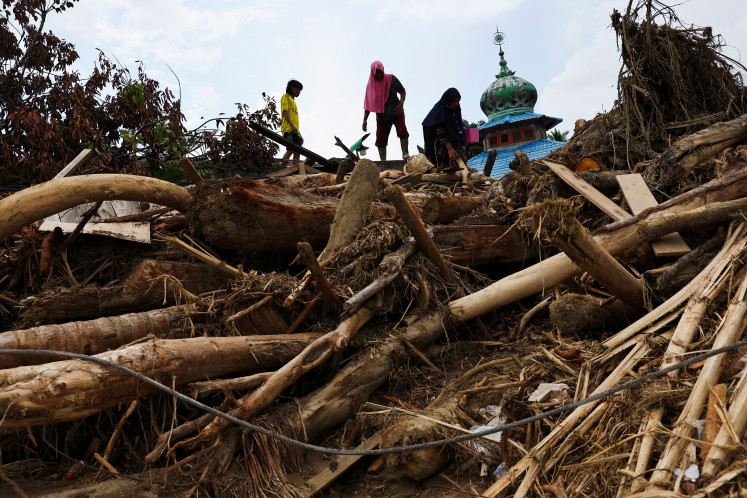Popular Reads
Top Results
Can't find what you're looking for?
View all search resultsPopular Reads
Top Results
Can't find what you're looking for?
View all search resultsGovt, insurers and victims agree on disaster insurance scheme
Kornelius Simanjuntak - JP/PJ LeoIn his doctoral dissertation, Kornelius Simanjuntak, a veteran insurance business player and scholar, said Indonesia urgently needed a national insurance scheme for natural disasters because the country was prone to such calamities
Change text size
Gift Premium Articles
to Anyone
Kornelius Simanjuntak - JP/PJ Leo
In his doctoral dissertation, Kornelius Simanjuntak, a veteran insurance business player and scholar, said Indonesia urgently needed a national insurance scheme for natural disasters because the country was prone to such calamities.
Citing the experiences of other countries, such as Japan, Kornelius pointed out that insurance payments were instrumental in helping victims start over.
Many agree.
Victims of the Sinabung eruptions in Tanah Karo, North Sumatra, have long planned to insure their assets, especially their fertile fields, because they do not want to go through the same hardships they endured in the past when disaster strikes. Many of them have lived in shelters for years because they lost nearly all of their assets and are dependent on government and private sector humanitarian assistance.
Feryanta Meliala, a farmer in Gurukinayan subdistrict, said villagers were aware of the importance of insuring their property, but did not know how to join an insurance scheme.
“If my field and house were insured I would not need to endure this very painful tragedy,” said the 35-year-old farmer.
National Disaster Mitigation Agency (BNPB) spokesperson Sutopo Purwo Nugroho said Thursday that the country needed a natural disaster insurance scheme to help victims repair their dwellings. Sutopo said premiums should be covered by the central government and disbursed soon after a disaster hit a region based on the amount of damage to a victim’s home.
The Finance Ministry allocated only about Rp 4 trillion (US$306.5 million) for disaster management in the revised 2016 state budget. Sutopo said Indonesia needed about Rp 15 trillion a year for disaster management.
As of September, the BNPB recorded 1,704 disasters having occurred in the country, forcing 2.2 million people to seek temporary shelter, while 25,000 dwellings had been damaged. In 2015 alone there were 1,582 disasters, down from the 1,967 recorded in 2014.
“For recovery following the earthquake in Padang in 2009, the government needed Rp 6.3 trillion,” said Sutopo.
In his dissertation entitled Natural Disaster Insurance: A study on the needs of natural disaster insurance to help and compensate victims of natural disaster in Indonesia, Kornelius proposes the establishment of a special insurance scheme. Premiums vary depending on how prone a region is to disaster. People living in more disaster-prone regions should pay a higher premium, he added.
“All insurance companies should jointly work together with the government to handle the premiums,” said Kornelius, who is a CEO at a private insurance company and also a lecturer at the University of Indonesia’s School of Law.
Kornelius conducted research in Indonesia and seven other countries, including Japan, New Zealand, Taiwan and Turkey. Japan has implemented a natural disaster insurance scheme, which assisted victims in Sendai, a city in Japan hit by a 9.0 magnitude earthquake that caused a tsunami with 9-meter waves on June 21, 2011. The disaster damaged 1.16 million homes.
In 100 days post-disaster, he continued, Japan’s general insurance companies paid insurance claims of Rp 123.79 trillion, which helped victims rebuild their dwellings faster.
Indonesian people are very generous in providing humanitarian assistance for victims. But the country needs a much more substantial approach to overcome issues caused by disasters.
“The government needs to consider a mandatory insurance scheme,” said Kornelius.
General Insurance Association of Indonesia (AAUI) chairman Yasril Y. Rasyid also agreed. The scheme is quite ideal for disaster-prone areas because funding from the government alone would not be enough to rehabilitate the affected areas.
“The government should pay the premiums as part of a citizens’ protection program,” he said. (wnd)










